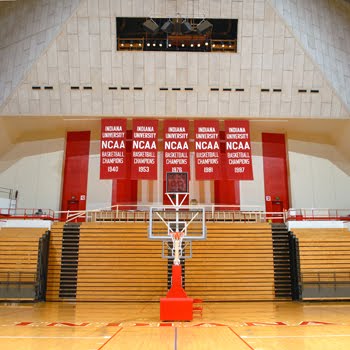I must admit that until I returned to South Florida, I had only rarely read Orlando Sentinel columnist Kathleen Parker, usually when I was traveling somewhere and found her in a local newspaper that carried the work of the Washington Post Writers Group's members.
More recently, though, I've become familair with her p.o.v. thru the South Florida Sun-Sentinel, even though I have her as one of my "Google Alerts" so I don't miss one of her columns or someone elsewhere in the country writing about her.
I agree with her two most recent columns 100%, which believe me, is rare praise from me.
She didn't mention, though, in case it matters to you, that the author she mentions, Kenneth Pollack, is Ted Koppell's son-in-law.
______________________________________________
http://www.orlandosentinel.com/news/opinion/columnists/orl-parker0207may02,0,6989782,print.column
May 2, 2007
Kathleen Parker
Hillary Clinton's 27 words
ORANGEBURG, S.C. -- Of all the words spilled during the recent Democratic presidential debate, the most interesting were 27 of Hillary Clinton's in response to a question about the candidates' biggest mistakes.
Clinton began self-effacingly, saying that her mistakes were too numerous to list, but offered a couple: that whole health care thing. "And, you know, believing the president when he said he would go to the United Nations and put inspectors into Iraq to determine whether they had WMD."
Say what? While we're pulling deflections out of the memory hole, what about believing the international community that Saddam Hussein had chemical and biological weapons?
Or, to bring it closer to home, what about believing her husband, who told Larry King on July 22, 2003, that "it is incontestable that on the day I left office, there were unaccounted for stocks of biological and chemical weapons"?
What Hillary Clinton was trying to say, it seems, was anything to avoid suggesting that she had made a mistake in voting for the 2002 joint resolution authorizing the use of force against Iraq.
Admitting error regarding Iraq has become the litmus test for Democratic candidates. Among the top tier, John Edwards has repeatedly declared his vote a mistake. Barack Obama, though not yet in Congress at the time of the vote, was always opposed to the war and says he predicted what has come to pass. Clinton had admirably resisted joining the mea culpa chorus, but finally succumbed. If she had known then what she knows now, she began saying relatively recently, she wouldn't have voted the way she did.
Quick show of hands: How many would have supported invading Iraq had they known there were no WMD? Doubtless, not many, even though overthrowing Saddam Hussein had been a standing U.S. policy since the late 1990s.
Kenneth Pollack, author of The Threatening Storm: The Case for Invading Iraq, said in a 2004 interview that he shared the Bush administration's belief that "it would eventually be necessary to go to war to prevent Saddam Hussein from acquiring nuclear weapons."
Pollack, who was an Iran-Iraq military analyst for the CIA, differed with the Bush administration about when and how to tackle Iraq. Though highly critical of pre- and post-war planning, he, too, believed that Saddam was a threat.
"I can't think of anyone who did not believe that the Iraqis had a weapons of mass destruction program," he said. "There was simply no one."
Even Saddam believed he had a biological, chemical and, possibly, nuclear program in place. As David Kay told The New York Times following his post-invasion survey of suspected arms caches, Iraq was still researching and developing ricin production and weaponization up to the end. Otherwise, according to Kay, Saddam's scientists lied to the Iraqi leader about weapons programs in order to get government funds.
Among those who argued compellingly in favor of the war resolution was the now-contrite Edwards. On Sept. 12, 2002, he told the Senate that the time had come for decisive action against Saddam -- to do "whatever is necessary to guard against the threat posed by an Iraq armed with weapons of mass destruction, and under the thumb of Saddam Hussein."
Edwards may feel that the war has gone badly -- who doesn't? -- but his vote was consistent with thinking at the time that prevention was necessary to survival. The invasion was clearly aimed at guarding against the unthinkable in the context of fresh and horrific wounds.
Saying that one's vote -- exercised in good conscience based on convincing information --- was a mistake is meaningless rhetoric in the service of politics. Clinton seemed to understand that and her resistance to the cheap grace of public confession was refreshing while it lasted.
Her biggest mistake, alas, was not in believing that Bush would place U.N. inspectors in Iraq, which was never part of the war resolution. Bush did say, perhaps disingenuously, that he hoped force wouldn't be necessary -- and many wished that inspectors, who were in Iraq, had had more time.
But Saddam was persistently in violation of U.N. resolutions. Believing Bush seemed a better bet than believing Saddam.
The clear intent of the resolution, meanwhile, was to authorize war, if necessary. That's what Clinton voted for. Her mistake is trying to pretend it was something else, and hoping no one will notice.
________________________________
http://www.orlandosentinel.com/news/opinion/columnists/orl-parker2907apr29,0,6143446.column
April 29, 2007
Kathleen Parker
Dean's world in a sound bite
One can understand why Howard Dean feels that the world would be better off without the press, as he suggested recently to a group of bankers.
Dean, the Democratic National Committee chairman, was responding to a banker's complaint that candidates speak only in sound bites.His solution: "Have candidates in to meetings like this and bar the press."Now there's a concept from a man who should know.Few have benefited less from media exposure than Dean, who will be forever remembered as "The Scream" for his war whoop during his 2004 presidential election bid.
Then again, Dean of all people should also know that citizen journalists are everywhere, even at banking conventions, and that nearly everybody has a video phone and access to YouTube."
Barring the press," alas, would require human extinction. Another concept for another day. Meanwhile, we know what Dean meant. And, doubtless, many Americans reflexively agree. The media are not beloved by many -- at least not until the many consider the alternative. Saddam Hussein didn't like the media either.
But Dean has a point, which is that the omnipresent, omnivorous (not omniscient) media more often distort than reveal the truth. Driven by corporate profit motives, media conglomerates pander to the least noble of man's appetites and become "infotainment," as Dean put it.
We've all bemoaned the shallowness of news coverage that pays lip service to issues while plumbing the depths of paternity when an illegitimate child is born to a money-filching, drug-addicted stripper. Oh, sorry. I mean a widowed mother who worked her way up from small-town obscurity to prominence through the visual arts.
Thus, inadvertently, Dean was making a case for the written word. When we speak of media today, after all, we're really talking less about newspapers and magazines than of cameras and video screens. In a world where television, YouTube and the Internet dominate the media field, visual imagery necessarily dominates discourse.
If one were to play the word association game with top presidential candidates, saying the first word that a person's name inspires, that word most likely would be visual -- or possibly auditory. In either case, both are captured by film and tape, as opposed to words on the printed or virtual page.
Admit it: Say John Edwards, we think hair; Hillary Clinton, pantsuits; Barack Obama, so far, a smile; Mitt Romney, starched shirts and soap; John McCain, forever a POW; Rudy Giuliani, the man from Ground Zero.
These are superficial characterizations, but images matter. They register with the unconscious as symbols and evoke a visceral response precisely because they're processed by the brain's right hemisphere where our emotions hang out. Written language, on the other hand, is processed by our left hemisphere -- home to reason and logic.
Our right lobe feels; our left lobe thinks. It's no mystery why the Democratic Party, identified as the more-feeling party, is also home to more artists and actors, while the Republican Party tends to attract more business-minded folks.
This is an oversimplification of the workings of brains and politics, clearly. We're all a little bit this and little bit that, and the lobes, though one usually dominates, communicate with each other through 250 million or so nerve fibers. Some of us are even ambidextrous, though we try to keep it quiet.But the issue Dean raises about honesty vis-a-vis media in the political realm underscores the danger of relying too much on what the camera delivers versus what the mind deduces from reasoning through the written word. What we see is not all of what we get.We don't want to live by words alone, obviously. Emotions aren't frivolous, but they are another form of information. Visceral responses, otherwise known as "gut feelings" or intuition, are often reliable, if primitive, ways of knowing.
Yet when it comes to understanding issues, television becomes the enemy of thought and YouTube is inherently unfair by the deliberate exclusion of context.
Of course, thinking is harder than feeling, which may explain why reading has fallen in disfavor and candidates scramble to post their own flicks on YouTube. But Americans who want to make informed choices would do well to spend more time reading than watching.The "boob tube" got its nickname fair and square.
Thursday, May 3, 2007
Subscribe to:
Comments (Atom)
In the Heart of a Great Country, Beats the Soul of Hoosier Nation
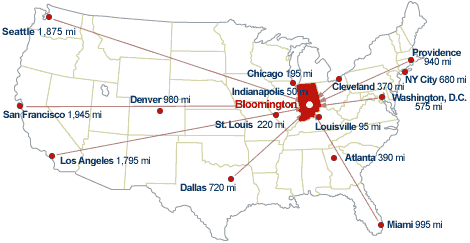
"In the Heart of a Great Country, Beats the Soul of Hoosier Nation." -South Beach Hoosier, 2007
#IUBB, #bannersix
The South Florida I Grew Up In
Excerpts from Joan Didion's Miami, 1987, Simon & Schuster:
In the continuing opera still called, even by Cubans who have now lived the largest part of their lives in this country, el exilo, the exile, meetings at private homes in Miami Beach are seen to have consequences. The actions of individuals are seen to affect events directly. Revolutions and counter-revolutions are framed in the private sector, and the state security apparatus exists exclusively to be enlisted by one or another private player. That this particular political style, indigenous to the Caribbean and to Central America, has now been naturalized in the United States is one reason why, on the flat coastal swamps of South Florida, where the palmettos once blew over the detritus of a dozen failed booms and the hotels were boarded up six months a year, there has evolved since the early New Year's morning in 1959 when Fulgencio Batista flew for the last time out of Havana a settlement of considerable interest, not exactly an American city as American cities have until recently been understood but a tropical capital: long on rumor, short on memory, overbuilt on the chimera of runaway money and referring not to New York or Boston or Los Angeles or Atlanta but to Caracas and Mexico, to Havana and to Bogota and to Paris and Madrid. Of American cities Miami has since 1959 connected only to Washington, which is the peculiarity of both places, and increasingly the warp...
"The general wildness, the eternal labyrinths of waters and marshes, interlocked and apparently neverending; the whole surrounded by interminable swamps... Here I am then in the Floridas, thought I," John James Audobon wrote to the editor of The Monthly American Journal of Geology and Natural Science during the course of an 1831 foray in the territory then still called the Floridas. The place came first, and to touch down there is to begin to understand why at least six administations now have found South Florida so fecund a colony. I never passed through security for a flight to Miami without experiencing a certain weightlessness, the heightened wariness of having left the developed world for a more fluid atmosphere, one in which the native distrust of extreme possibilities that tended to ground the temperate United States in an obeisance to democratic institutions seemed rooted, if at all, only shallowly.
At the gate for such flights the preferred language was already Spanish. Delays were explained by weather in Panama. The very names of the scheduled destinations suggested a world in which many evangelical inclinations had historically been accomodated, many yearnings toward empire indulged...
In this mood Miami seemed not a city at all but a tale, a romance of the tropics, a kind of waking dream in which any possibility could and would be accomodated...
Hallandale Beach Blog
http://www.hallandalebeachblog.blogspot.com/
Hallandale Beach Blog is where I try to inject or otherwise superimpose a degree of accountability, transparency and much-needed insight onto local Broward County government and public policy issues, which I feel is sorely lacking in local media now, despite all the technological advances that have taken place since I grew-up in South Florida in the 1970's. On this blog, I concentrate my energy, enthusiasm, anger, disdain and laser-like attention primarily on the coastal cities of Aventura, Hollywood and Hallandale Beach.
IF you lived in this part of South Florida, you'd ALREADY be in stultifying traffic, be paying higher-than-necessary taxes, and be continually musing about the chronic lack of any real accountability or transparency among not only elected govt. officials, but also of City, County and State employees as well. Collectively, with a few rare exceptions, they couldn't be farther from the sort of strong results-oriented, work-ethic mentality that citizens here deserve and are paying for.
This is particularly true in the town I live in, the City of Hallandale Beach, just north of Aventura and south of Hollywood. There, the Perfect Storm of years of apathy, incompetency and cronyism are all too readily apparent.
It's a city with tremendous potential because of its terrific location and weather, yet its citizens have become numb to its outrages and screw-ups after years of the worst kind of chronic mismanagement and lack of foresight. On a daily basis, they wake up and see the same old problems again that have never being adequately resolved by the city in a logical and responsible fashion. Instead the city government either closes their eyes and hopes you'll forget the problem, or kicks them -once again- further down the road.
I used to ask myself, and not at all rhetorically, "Where are all the enterprising young reporters who want to show through their own hard work and enterprise, what REAL investigative reporting can produce?"
Hearing no response, I decided to start a blog that could do some of these things, taking the p.o.v. of a reasonable-but-skeptical person seeing the situation for the first time.
Someone who wanted questions answered in a honest and forthright fashion that citizens have the right to expect.
Hallandale Beach Blog intends to be a catalyst for positive change. http://www.hallandalebeachblog.blogspot.com/
http://www.hallandalebeachblog.blogspot.com/
Hallandale Beach Blog is where I try to inject or otherwise superimpose a degree of accountability, transparency and much-needed insight onto local Broward County government and public policy issues, which I feel is sorely lacking in local media now, despite all the technological advances that have taken place since I grew-up in South Florida in the 1970's. On this blog, I concentrate my energy, enthusiasm, anger, disdain and laser-like attention primarily on the coastal cities of Aventura, Hollywood and Hallandale Beach.
IF you lived in this part of South Florida, you'd ALREADY be in stultifying traffic, be paying higher-than-necessary taxes, and be continually musing about the chronic lack of any real accountability or transparency among not only elected govt. officials, but also of City, County and State employees as well. Collectively, with a few rare exceptions, they couldn't be farther from the sort of strong results-oriented, work-ethic mentality that citizens here deserve and are paying for.
This is particularly true in the town I live in, the City of Hallandale Beach, just north of Aventura and south of Hollywood. There, the Perfect Storm of years of apathy, incompetency and cronyism are all too readily apparent.
Sadly for its residents, Hallandale Beach is where even the easily-solved or entirely predictable quality-of-life problems are left to fester for YEARS on end, because of myopia, lack of common sense and the unsatisfactory management and coordination of resources and personnel.
It's a city with tremendous potential because of its terrific location and weather, yet its citizens have become numb to its outrages and screw-ups after years of the worst kind of chronic mismanagement and lack of foresight. On a daily basis, they wake up and see the same old problems again that have never being adequately resolved by the city in a logical and responsible fashion. Instead the city government either closes their eyes and hopes you'll forget the problem, or kicks them -once again- further down the road.
I used to ask myself, and not at all rhetorically, "Where are all the enterprising young reporters who want to show through their own hard work and enterprise, what REAL investigative reporting can produce?"
Hearing no response, I decided to start a blog that could do some of these things, taking the p.o.v. of a reasonable-but-skeptical person seeing the situation for the first time.
Someone who wanted questions answered in a honest and forthright fashion that citizens have the right to expect.
Hallandale Beach Blog intends to be a catalyst for positive change. http://www.hallandalebeachblog.blogspot.com/
Hallandale Beach's iconic beachball-colored Water Tower, between beach and A1A/South Ocean Drive
Hollywood in Cartoons, The New Yorker

"Gentlemen, I am happy to announce that as of today we are closing down our Washington news bureau and moving the entire operation to L.A."
Hollywood in Cartoons, The New Yorker
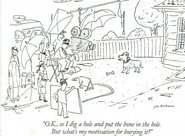
"O.K., so I dig a hole and put the bone in the hole. But what's my motivation for burying it?"
Hollywood in cartoons, 10-21-06 Non-Sequitur by Wiley, www-NON-SEQUITUR.COM

The Magic of Hollywood: A motion has been put forth that we should seek to create rather than imitate. All in favor of killing this silly notion, nod in mindless agreement...
Miami Dolphins

South Beach Hoosier's first Dolphin game at the Orange Bowl came in Dec. 1970, aged 9, a 45-3 win over Buffalo that propelled them into their first ever playoff appearance.
Sebastian the Ibis, the Spirited Mascot of the University of Miami Hurricanes

Before going to my first U-M game at the Orange Bowl in 1972, a friend's father often would bring me home an extra 'Canes game program. That's how I came to have the Alabama at U-M game program from Nov. 16, 1968, which was the first nationally-televised college football night game in color. (A 14-6 loss to the Crimson Tide.) After that first ballgame against Tulane, as l often did for Dolphin games if my father wasn't going, I'd get dropped off at the Levitz parking lot near the 836 & I-95 Cloverleaf in NMB, and catch a Dade County Park & Ride bus, going straight to the Orange Bowl. Onboard, I'd get next to the window and listen to WIOD's pre-game show on my Radio Shack transistor radio. A few times, I was just about the only person onboard besides the bus driver, which was alright by me. Once at the Orange Bowl, if I didn't already have a ticket, I'd buy a game program for myself and one or two for friends or teachers before heading to the ticket window, since you usually couldn't find a program vendor once inside. I probaly had a friend or my father with me for just under 40% of the U-M games I ever went to, but you have to remember that the team, though blessed with several talented players, like Chuck Foreman and Burgess Owens, was just so-so to average at best, and the games were usually played on Friday nights, so it wasn't exactly high on everyone's list of things to do. Depending upon the opponent, if I was alone, I'd often have entire areas of the Orange Bowl to myself. (Wish I had photos of that now!) For instance, I had a good portion of the East (open) End Zone to myself against Oklahoma in the mid-70's, when the Boomer Schooner and the Schooner Crew went out on the field after an Oklahoma TD, and the Schooner received an unsportsmanlike conduct penalty from the refs, as would happen years later in an Orangle Bowl Classic game. (Against FSU?) I was there for the wins and losses under Pete Elliott, Carl Selmer & Lou Saban, and the huge on-field fight in '73 when under eventual national champion Notre Dame (under Ara Parseghian), they called a time-out with less than a minute to go, and already up 37-0. Their rationale? To score another TD and impress the AP football writers; final score 44-0. Well, they got their wish and beat Alabama 24-23 for the title at the Sugar Bowl. A year later, thanks to my Mom's boss, she and I saw Ara's last game as head coach of the Irish in the Orange Bowl Game from the East End Zone -in front of the Alabama cheerleaders!!!- in an exciting 13-11 Notre Dame win over Alabama and Bear Bryant, a rematch of the '73 national title game. I was also present for the U-M's huge 20-15 win under Pete Elliott against Darrel Royal's Texas Longhorns, the week Sports Illustrated's College Football preview issue came out with Texas on the cover, below. I was also present for lots of wins against schools called College of the Pacific, UNLV and Cal-Poly San Luis Obsispo, which I'd then never heard of before.
Miami Dolphins Cheerleaders, April 28, 2007

Photo by Mario J. Bermudez. April 28, 2007 at Dolphins NFL Draft Party at Dolphin HQ, Davie, FL
Of cheerleaders past and present
Given South Florida's unique version of the melting pot -con salsa- demographics and mindset, these women in the photo above are surely what most South Floridians would consider attractive women. But for this observer, who's spent hours & hours at IU cheerleader tryouts and who has known dozens of cheerleaders -and wannabes- in North Miami Beach, Bloomington, Evanston and Washington, D.C., the whole time I was watching these members of the Dolphins' squad perform, I couldn't help but compare them and their routines to those of some IU friends of mine who ALWAYS showed true Hoosier spirit & enthusiasm.
Sitting at my table right near the stage and still later, while watching the long lines of Dolphin fans of all ages waiting to snap photos of themselves with the cheerleaders, I couldn't help but think about those friends who always left me and other Hoosier fans feeling positive & optimistic.
Was there anyone I saw in Davie who possessed these valuable intangibles: the dancing precision of IU Red Stepper -and Captain- Gail Amster, my talented and spirited Phi Beta Kappa pal from Deerfield (IL), who always sat next to me in our Telecom. classes as we took turns entertaining the other; the ebullient spirit & energy of two Hoosier cheerleaders -and captains- from Bloomington, Wendy (Mulholland) Moyle & Sara Cox; the hypnotic, Midwestern, girl-next-door sexiness of Hoosier cheerleader Julie Bymaster, from Brownsburg; or, the adorable Southern girl-next-door appeal of former Hoosier Pom squader Jennifer Grimes, of Louisville, always such a clear distraction while sitting underneath the basket?
Nope, not that I could see. But then they were VERY tough acts to follow!!!
And that's not to mention my talented & spirited friends like Denise Andrews of Portage, Jody Kosanovich of Hammond & Linda Ahlbrand of Chesterton, all of whom were dynamic cheerleaders -and captains- at very large Hoosier high schools that were always in the championship mix, with Denise's team winning the Ind. football championship her senior year when she was captain -just like in a movie. That Denise, Jody & Linda all lived on the same dorm floor, just three stories above me at Briscoe Quad our freshman year, was one of the greatest coincidences -and strokes of luck for me!- that I could've ever hoped for.
You could hardly ask for better ambassadors of IU than THESE very smart, sweet and talented women. In a future SBH post, I'll tell the story of one of the greatest Hoosiers I ever met, the aforementioned Wendy Mulholland, the Bloomington-born captain and emotional heart of the great early '80's IU cheerleading squads, and the daughter of Jack Mulholland, IU's former longtime Treasurer. The acorn doesn't fall far from a tree built on a foundation of integrity & community service!
(After he retired, Mr. Mulholland was the first executive director of the Community Foundation of Bloomington and Monroe County. I used to joke with Wendy that her dad's name was the one that was permanently affixed to the bottom of my work-study checks for years, while I worked at the Dept. of Political Science's Library, first, at the Student Building in the old part of campus, and then later, after it was refurbished, in magnificent Woodburn Hall, my favorite building on campus.)
In that future post, I'll share some reflections on Wendy's great strength of character and personality; my intentions of returning to Bloomington a few weeks before Fall '82 classes started, so I could help Wendy train and work-out to rehab her knee, so she'd feel confident in trying-out for the squad again, following a bad knee injury that'd left her physically-unable to try-out for the squad the previous spring, a big disappointment to those of us who cared about both Wendy and the team; my incredulity at, quite literally, running into Wendy while walking down a sidewalk one afternoon a few years later in Evanston, IL, when we were astonished to discover we were both living there, with me trying to hook on with a Windy City advertising agency, and Wendy then-attending Kellogg (KGSM) at Northwestern, right when the WSJ had named Kellogg the #1 Business School in the country.
I'll also share a story about Wendy performing a true act of kindness towards me in 1982, when I was having a real emergency, and she went above-and-beyond what I had any logical reason to expect. Yet, Wendy, along with her very helpful dad, Jack, came through for me when I was in a very bad time crunch. I've never forgotten Wendy's kindness towards me, and her true Hoosier spirit.
There's NOTHING I wouldn't do for Wendy Mulholland.
It's All About "The U"

South Beach Hoosier's first U-M football game at the Orange Bowl was in 1972, age 11, against Tulane in the infamous "Fifth Down" game. In order to drum up support and attendance for the U-M at the Orange Bowl, that game had a promotion whereby South Florida kids who were school safety patrols could get in for free IF they wore their sash. I did. Clearly they knew that it was better to let kids in for free, knowing their parents would give them money to buy food and souvenirs, perhaps become a fan and want to return for future games. The ballgame made an interesting impression on The New York Times, resulting in this gem from the "View of Sport" column of Oct, 14, 1990, labeled 'Fifth Down or Not, It's Over When It's Over.' -"In 1972, aided by a fifth-down officiating gift in the last moments of the game, Miami of Florida defeated Tulane, 24-21. The country and the world was a much different place that fall because The New York Times took time and space to editorialize on the subject. ''Is it right for sportsmen, particularly young athletes, to be penalized or deprived of the goals for which they earnestly competed because responsible officials make mistakes? The ideal of true sportsmanship would be better served if Miami forfeited last week's game.' South Beach Hoosier hardly needs to tell you that this was YET another New York Times editoral that was completely ignored!
The issue I took with me the night of U-M's 20-15 upset of #1 Texas at the Orange Bowl
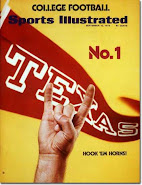
College Football, Texas No. 1, Hook 'em Horns, Sept. 10, 1973. Living in North Miami Beach in the '70's, my Sports Illustrated usually showed up in my mailbox on the Thursday or Friday before the Monday cover date. And was read cover-to-cover by Sunday morning.
The Perfect Storm
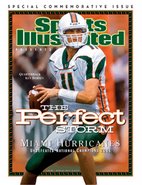
U-M QB Ken Dorsey, Miami Hurricanes Undefeated National Champions 2001, Jan. 2002
Miami's Romp in the Rose
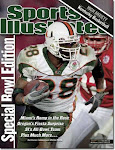
Miami running back Clinton Portis, Jan. 7, 2002
Why the University of Miami should drop football
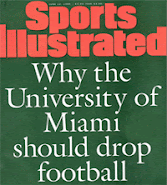
June 12, 1995
REVENGE!
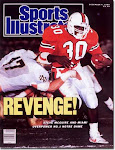
Steve McGuire and Miami Overpower No.1 Notre Dame, Dec. 4, 1989
How Sweet It Is!
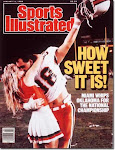
Miami Whips Oklahoma For The National Championship, Pictured: Dennis Kelleher, Jan. 11, 1988
My, Oh My, Miami!
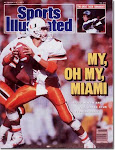
Steve Walsh and the Canes Stun FSU, Oct. 12, 1987
Why Is Miami No. 1?

QB Vinny Testaverde, Nov. 24, 1986
Miracle In Miami
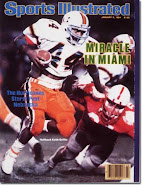
The Hurricanes Storm Past Nebraska, Halfback Keith Griffin, Jan. 9, 1984
Special Issue: College Football
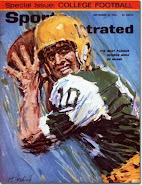
The Best Passer, George Mira of Miami, Sept. 23, 1963
1984 College & Pro Spectatcular
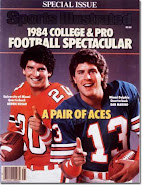
A Pair Of Aces: U-M QB Bernie Kosar & Miami Dolphin QB Dan Marino, Sept. 5, 1984
Pro Football Hall of Fame Special Issue

Dan Marino, Class of 2005, Aug. 2005
FACES OF THE NFL
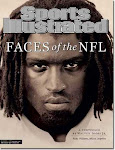
A Portfolio by Walter Iooss Jr., Ricky Williams, Miami Dolphins, Dec. 9, 2002
Coming Back
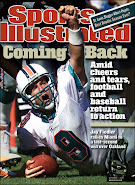
Jay Fiedler rallies Miami to a last-second win over Oakland, Oct. 1, 2001
Dan's Last Stand
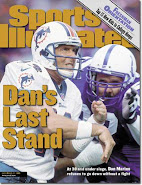
At 38 and under siege, Dan Marino refuses to go down without a fight, Dec. 13, 1999
The War Zone
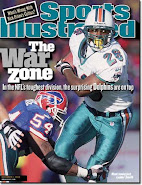
In the NFL's toughest division, the surprising Dolphins are on top, Lamar Smith, Dec. 11, 2000
Down and Dirty
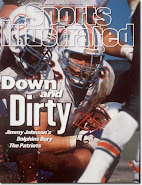
Jimmy Johnson's Dolphins Bury The Patriots, Steve Emtman, Sept. 9, 1996
The Sunshine Boys

Now Playing in Miami: The Dan Marino and Jimmy Johnson Show, May 11, 1996
HOT & NOT

Miami loves Pat Riley but wants to give Don Shula the boot, Dec. 11, 1995
NFL PREVIEW 1995
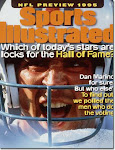
Which of today's stars are locks for the Hall of Fame? Dan Marino for sure. But who else? To find out, we polled the men who do the voting. Sept. 14, 1995
Sportsman Of The Year

Don Shula, Dec. 20, 1993
Dan The Man
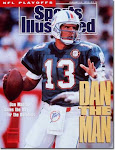
Dan Marino Saves The Day For The Dolphins, Jan. 14, 1991
Dangerous Dan
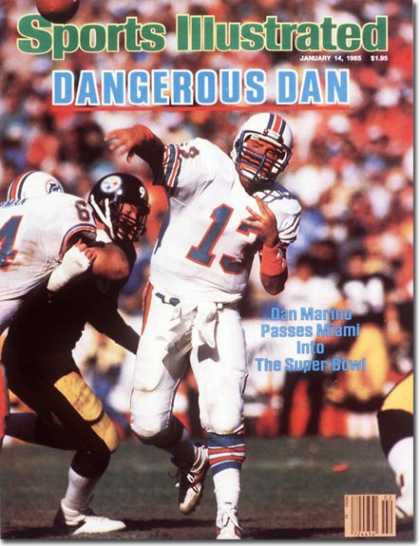
Dan Marino Passes Miami Into The Super Bowl, Jan. 14, 1985
Super Duper!

Wide Receiver Mark Duper Of The Undefeated Dolphins, Nov. 19, 1984
Air Raid! Miami Bombs Washington
+Sep+10,+1984.jpg)
Mark Clayton (burning Darryl Green) Sept. 10, 1984
Rookies On The Rise
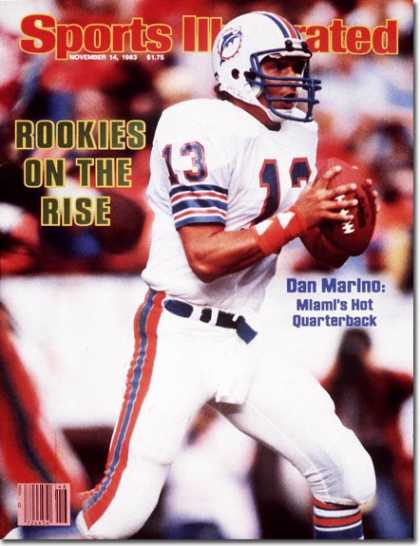
Dan Marino: Miami's Hot Quarterback, Nov. 14, 1983
New Life In The WFL
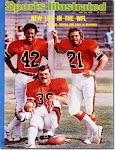
Warfield, Csonka and Kiick of Memphis, July 28, 1975
Zonk! Miami Massacres Minnesota
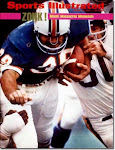
Larry Csonka, Jan. 21, 1974
Pro Football, Miami Is Rough And Ready
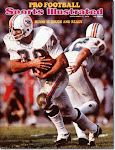
Larry Csonka & Bob Griese, Sept. 17, 1973
Miami All The Way
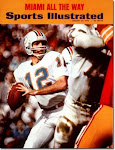
Bob Griese, Jan. 22, 1973
It's Miami and Washington
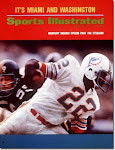
Mercury Morris Speeds Past The Steelers, Jan. 8, 1973
Kiick and Csonka, Miami's Dynamic Duo

Larry Csonka & Jim Kiick, Aug. 7, 1972
Sudden Death at Kansas City
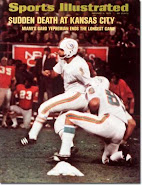
Miami's Garo Yepremian Ends the Longest Game; (kneeling) placekick holder Karl Noonan, Jan. 3, 1972
New Pro in a New Town

Miami's Frank Emanuel, Aug. 8, 1966
Old-style "Obie" the Orange Bowl Committee mascot

The iconic image I grew-up with in Miami, before FedEx got into the picture

